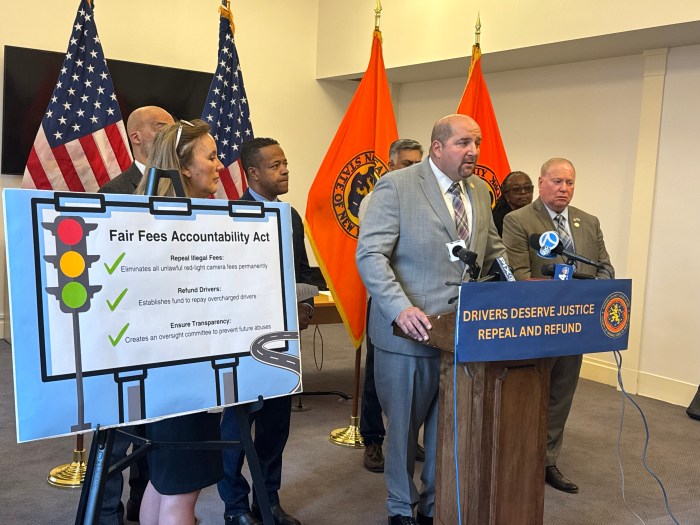
If all goes well in the nation’s capital, $120 billion will be sent to restaurants and catering halls across the country. The RESTAURANTS Act of 2020 calls on the federal government to assist restaurants and catering halls that were forced to shut their doors since the pandemic created stay-at-home orders at the beginning of March.
While other portions of the economy, such as the airline industry, have received federal bail-out packages, restaurateurs have been left standing in the dust. Now, Congressmen Tom Suozzi (D—Glen Cove) and Earl Blumenauer (D—Portland) have introduced a program that will provide grants, not loans, to these businesses. On Long Island, this is vital as the restaurant and catering industries attempt to get back on their feet.
The pair of representatives held a Zoom call on July 27 with business owners from Long Island and Queens, addressing growing concerns of how they will re-open their doors. The bill is officially entitled the Real Economic Support That Acknowledges Unique Restaurant Assistance Needed To Survive (RESTAURANTS) Act.
“Catering, specifically weddings, on Long Island is a major industry and our catering houses have been completely shut down,” Tony Scotto, who owns Scotto’s in Woodbury, said on the Zoom call. “Here on Long Island, it is not just catering. You have to take into consideration the trickle-down impact on vendors including florists, photographers, musicians, limousine services, bridal shops, tuxedo rentals, hair salons, hotels and others. It has been disastrous to so many.”
Unlike the paycheck protect program (PPP) from the Small Business Administration (SBA), the RESTAURANTS Act proposes that business owners who receive compensation will not have to pay back the grants.
The bill calls the $120 billion package the Restaurant Stabilization Fund, which will actually generate about $183 billion in benefits, with an additional $65 billion in secondary benefits.
“In return, use of the Restaurant Stabilization Fund would not only help reduce unemployment, but would also jump start the economy by instilling confidence in consumers to re-engage in other economic activity after they resume eating at restaurants,” the bill reads.
Suozzi believes the bill, should it pass, will have a tremendous impact on Long Island. With the tourism industry also hurting, he believes this will help boost local restaurants in areas that usually see an influx of travelers each summer and fall.
“There is no question that the restaurant and catering industry has been hit so hard,” Suozzi said on the call. “Many businesses haven’t even opened at all because they can only hold parties of up to 50 people.”
Kristen Jarnagin, the president and CEO of Discover Long Island, explained just how hard Long Island is getting hit financially due to the pandemic.
“The $6.1 billion tourism industry on Long Island that supports more than 100,000 local jobs has suffered the brunt of losses and hardships resulting from COVID-19 shutdowns and economic impacts,” Jarnagin said. “We are grateful to Congressman Suozzi and the co-sponsors signed on to Congressman Blumenauer’s critical legislation that supports independent restaurants and catering halls, as well the countless vendors that rely on those outlets, who are the family-owned, small businesses that make up the fabric of our communities and our region.”
Jarnagin explained this is a sector that needs to get back to business right away. Not every restaurant can do outdoor dining, and the same can be said about outdoor catering.
“It’s critical that we address this,” she said.
So the RESTAURANTS Act of 2020 will not only help these businesses re-open, but it will actually create long-term jobs for thousands of people.
“Long Island and the piece of Queens I represent has about 8,000 restaurants with about 100,000 employees who have been impacted,” Suozzi said. “That’s just a little bit of Long Island and Queens. You have the entire country, and it’s much more than that.”
Suozzi said Congressman Peter King (R—Seaford) is hopping on board as one of the co-sponsors for this bill, too.
“Long Island has amazing challenges in terms of how you protect the little communities,” Blumenauer said. “The independent restaurant is the cornerstone of a community. Often, restaurants are the first job for many people.”
The grants will be eligible to cover the difference for these businesses for revenues based on 2019 earnings compared to the projected revenues of this year. Expenses included in the RESTAURANTS Act will include payroll (but not for people earning more than $100,000 per year), benefits, mortgage, rent, utilities, maintenance, supplies, food, debt to suppliers, as well as other costs that can be looked at on a case-by-case basis.
The bill was officially introduced to Congress on June 15 and it currently has 123 co-sponsors. It will likely be voted upon in the House of Representatives this summer before heading to the Senate for approval.





























